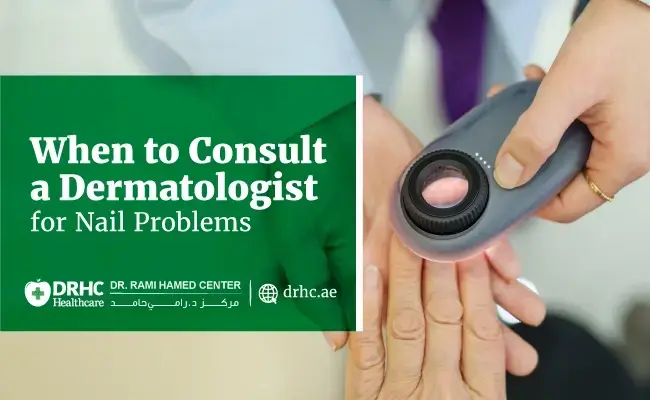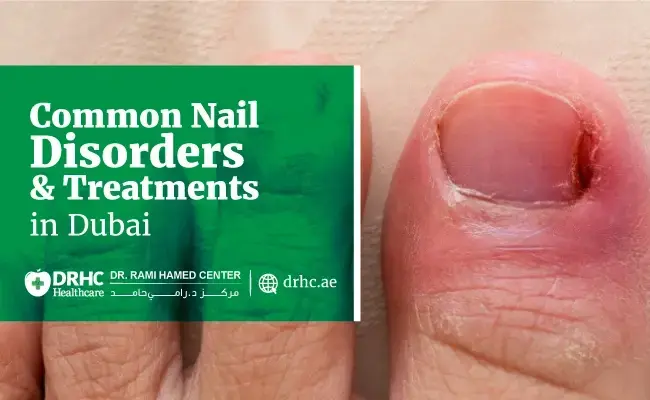
If you’ve ever experienced itchy, red welts that come and go, you know how frustrating hives can be. While many cases are temporary and resolve within a few hours or days, some people struggle with symptoms that persist for weeks—or even months. This condition, known as chronic hives (chronic urticaria), can interfere with daily comfort and quality of life.
At Dr. Rami Hamed Center (DRHC) in Dubai, we understand how challenging it can be to live with ongoing skin irritation and uncertainty about what’s causing it. This guide will help you recognize the signs of chronic hives, understand possible causes, and know when it’s time to see a specialist.
What Are Chronic Hives?
Chronic hives are raised, itchy welts that appear on the skin almost daily for more than six weeks. These welts can vary in size, move around the body, and sometimes be accompanied by swelling (angioedema), particularly around the eyes or lips.
Unlike acute hives, which are usually triggered by an allergy or infection, chronic hives often have no clear cause—making them more complex to diagnose and manage.
Common Triggers of Chronic Hives
Even when the exact cause is unknown, certain factors are known to worsen symptoms. In Dubai’s climate and lifestyle, some triggers are particularly common:
- Heat and Humidity: Prolonged sun exposure and sweating can lead to flare-ups.
- Stress: Emotional tension can intensify itching and the frequency of hives.
- Foods and Additives: Shellfish, nuts, eggs, and certain preservatives are common culprits.
- Medications: Pain relievers like aspirin or ibuprofen can sometimes trigger or worsen hives.
- Infections or Illness: Viral or autoimmune conditions may contribute to chronic inflammation.
- Skin Pressure or Friction: Tight clothing or pressure from straps may provoke reactions.
Identifying your personal triggers is the first step in long-term control, which is why professional evaluation is essential.
When to See a Specialist
While mild hives can often be managed with simple remedies, it’s important to consult a dermatologist or allergy specialist if:
- Your hives persist for more than six weeks.
- They interfere with your sleep or daily activities.
- You notice swelling in your lips, eyes, or throat.
- Over-the-counter antihistamines don’t provide relief.
- You experience frequent recurrences without clear triggers.
Chronic hives can sometimes indicate an underlying immune, thyroid, or allergic condition. A specialist at DRHC Dubai can help pinpoint possible causes through allergy tests, blood work, and skin evaluations—allowing for a more effective, personalized treatment plan.
How Chronic Hives Are Treated at DRHC Dubai
At Dr. Rami Hamed Center, our dermatology and allergy specialists take a comprehensive approach to managing chronic hives, focusing on both symptom control and identifying root causes.
1. Allergy and Trigger Testing
We perform detailed assessments to identify allergens, environmental factors, or medical conditions contributing to your hives.
2. Antihistamines and Medications
Daily antihistamines help control itching and swelling. For resistant cases, advanced therapies such as biologic injections may be considered.
3. Lifestyle and Dietary Adjustments
Your specialist may recommend stress management, avoiding tight clothing, and eliminating certain foods to reduce flare-ups.
4. Long-Term Monitoring
Because chronic hives can fluctuate, ongoing follow-up helps adjust your treatment and maintain skin health over time.
Managing Chronic Hives at Home
While medical treatment is crucial, a few home care steps can make a big difference:
- Use cool compresses to relieve itching.
- Choose gentle, fragrance-free skincare products.
- Avoid hot showers, which can worsen irritation.
- Keep a symptom diary to track possible triggers.
Remember, hives are not contagious—but they can affect your comfort and confidence. Early management helps prevent unnecessary discomfort and anxiety.
FAQs About Chronic Hives in Dubai
1. Are chronic hives caused by allergies?
Not always. While some are allergy-related, many cases are linked to immune system sensitivity or unknown causes.
2. Can chronic hives go away on their own?
Some cases resolve within months, but others may persist for years without proper treatment.
3. Can Dubai’s climate worsen chronic hives?
Yes. Heat, humidity, and sweating can aggravate symptoms, especially in outdoor environments.
4. Is stress linked to hives?
Stress can trigger or worsen hives by affecting immune and hormonal balance.
5. What should I avoid during flare-ups?
Avoid scratching, tight clothing, hot baths, and foods or medications that previously caused reactions.
Conclusion
Chronic hives can be physically and emotionally draining, but you don’t have to face them alone. With the right diagnosis and treatment plan, symptoms can be managed effectively, allowing you to return to a more comfortable and confident lifestyle.
At Dr. Rami Hamed Center (DRHC) in Dubai, our specialists provide comprehensive care for all types of hives—from diagnosis to long-term management—using the latest medical advances tailored to your needs.
If your hives have lasted longer than six weeks or are disrupting your daily life, book a consultation today and take the first step toward clear, calm skin.
📞 Call / WhatsApp: +97142798200
📍 Visit Us: Dr Rami Hamed Center, Dubai Healthcare City
🌐 Website: www.drhc.ae
Topic: Dermatology







.webp)

Leave a comment